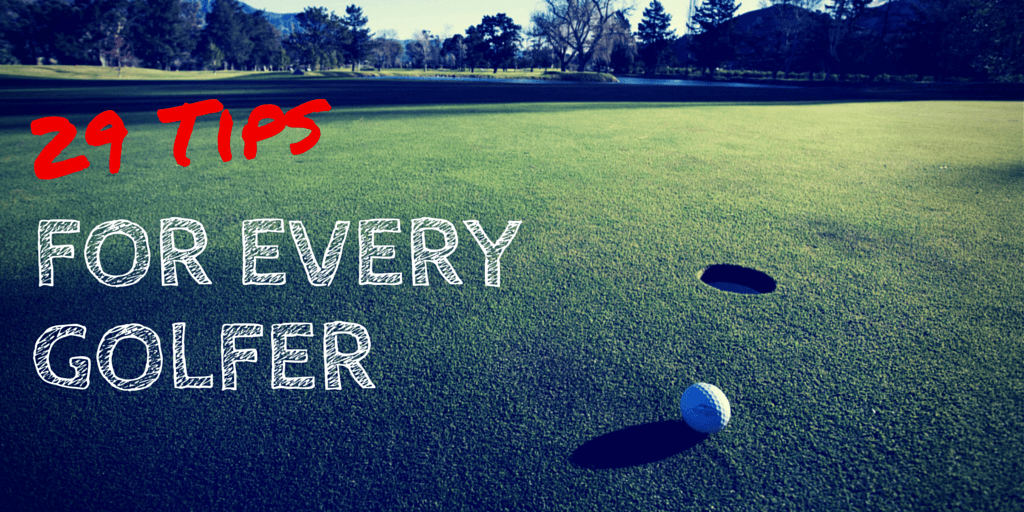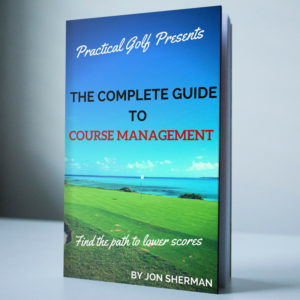
1) Don't chase a score on the course, you have to stay patient and let it come to you.
2) Change your practice routine, and start focusing on your weaknesses. If you keep doing the same things over and over again, why would your scores improve?
3) Don't pass the buck. It wasn't the club's fault, or the the wind, or the golf course. You are the captain of the ship. The sooner you take responsibility, and try to fix your mistakes, the better off your game will be.
4) Never assume you have it all figured out. Golf has a funny way of humbling you at the moments when you think you are invincible!
5) Enjoy the process. The one constant in golf is when you fix one thing in your game, another one will break. Accept it, and try to limit your frustrations. Golf is a beautiful mess.
6) Whatever scoring milestone you are looking to achieve, mastering your short game will probably be a huge part of it.

7) It's OK to get upset with yourself when things don't go your way during a round. It becomes a problem when you let it carry over to the next shot.
8) If you are obsessed with hitting the ball farther, you are likely ignoring parts of your game that will actually lower your score.
9) Your worst putt is usually better than your worst chip. Try using your putter more whenever you can if you are just off the green.
10) If you're not having fun, you will never get better. Focus on enjoyment first, and the rest will follow.
11) Your round one big gambling experiment. Self control is rewarded, and blind aggressiveness usually ends in disaster.
12) The number one priority on any tee shot is hitting the fairway, choose the club that gets you there.
13) There is no one right way to swing a golf club. Look at all of the different swings in golfing history.
14) Mastering one shot is better than trying to be good at 5 or 6.
15) If it's windy out, don't swing harder.
16) What happens on the 5th hole will be a distant memory by the 13th. Try and save every shot you can even if you're having a few bad holes. Things can turn around quickly!
17) Don't play an expensive pro-level ball if your game isn't suited for it. You're wasting money, and the extra spin on the ball will do more harm than good.
18) Try playing a few rounds where you don't keep score, and just focus on trying to hit good shots. You'll probably be amazed at how much fun you will have, and how capable you are of hitting great shots.
19) Bad shots are inevitable. The better golfers move past them immediately, and shift their focus to limiting the damage rather than compounding their mistake.
20) You can only handle so much technical information before it does more harm than good. If you have several different thoughts before you approach a shot, it's likely you won't be confident. Try working on one thing at a time until your are comfortable with it on the course.
21) New equipment, and getting fitted for clubs can help your game. Don't fall into the trap of giving it more importance than you should (See tip #3).
22) Be careful when someone makes a promise that's too good to be true for your game. Their training aid, or learning course is likely fool's gold.
23) If you are serious about becoming a better golfer you have to make a plan for yourself. Think long and hard about the parts of your game that need work, and make a practice schedule that focuses on those areas. If you just show up to the range, and start hitting balls without any purpose you will have wasted your time.
24) It's probably a good idea to have your swing looked at by a professional from time to time. Choose one that you are comfortable with. The most important part is being able to understand what they are saying. If it doesn't make sense, then they are not the right teacher for you.
25) What you see on TV is not reality for a golfer. Do not try and play the difficult shots that the pros can pull off. They've put in thousands of hours mastering them! That's why they make it look so easy.
26) Figure out some creative ways to practice at home. It can sometimes be much more effective than your work on the range.
27) Read some books, here are a list of 10 that every golfer should have on their shelves.
28) Your goal is to limit your 3 putts, not make more one putts.
29) Sometimes your best rounds are right around the corner. If you've had a few bad weeks on the course don't give up hope!
We care about the protection of your data Read our Privacy Policy